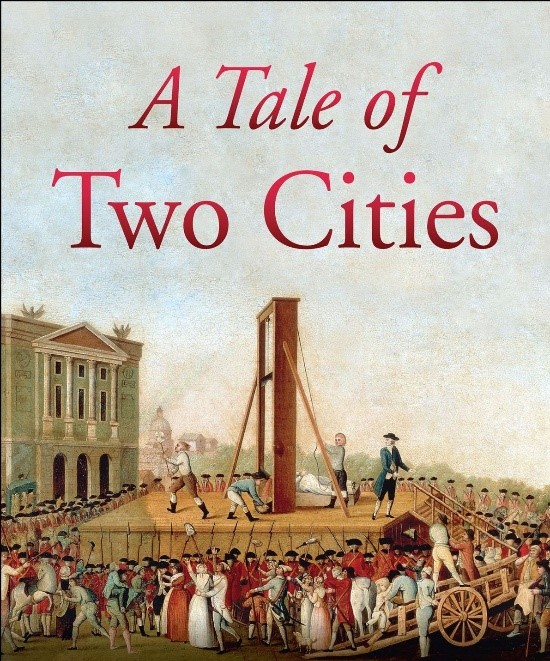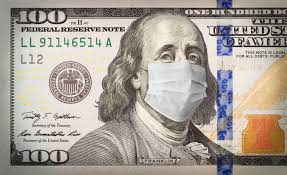Since I have been looking into Georgetown’s sales tax revenues and the continuing impact that the spread of Covid-19 has had on those revenues, I have discove red Texas cities have not been equally affected by the pandemic.
red Texas cities have not been equally affected by the pandemic.
As some cities have had their sales tax revenues significantly drop like Austin (-11%), other cities like San Marcos have had their sales tax revenues jump by 63%.
I took Charles Dickens’ approach and looked at A Tale of Two Cities for inspiration (and their sales tax revenues)…and selected San Marcos & Georgetown. San Marcos’ population (2018: 63,500) is a little smaller than Georgetown (2018: 74,180), but the Comptroller reported San Marcos’ July sales tax revenues at $4,645,120 (collected in May) while Georgetown only received $2,592,905…so what’s going on?
I started looking into why San Marcos received a 63% bump in revenues collected in May and in the same month over $2 million (+79%) more sales tax revenue than Georgetown…and discovered the inequitable truth about the imbalance.
I also discovered things could be changing and some cities are really upset about those changes. So which cities could be facing the guillotine?
It all comes down to an interesting twist of fate in the Texas Comptroller’s tax policy…34 Tex. Admin. Code § 3.34. This tax policy determines which cities receive the sales tax revenues for internet purchases made by Texans. Here’s the deal…if I went online today and purchased a product from Best Buy and had it delivered to my house, I would think that Georgetown would get the sales tax revenues from that purchase since I live in Georgetown. WRONG
It turns out that San Marcos would get the sales tax revenue from my internet purchase. It turns out that 34 Tex. Admin. Code § 3.34 determined that the Texas city where the company “fulfilled” the internet order would receive the sales tax revenue from my purchase and San Marcos is where Best Buy internet orders are received.
San Marcos’ economic development folks have been really busy. Back in 2016, San Marcos convinced Best Buy to locate their new e-commerce center to their City…through a very sweet incentive agreement. San Marcos agreed to give Best Buy a 10-year sales tax rebate at 75 percent of the sales going through their center, in addition to other incentives according to news reports.
San Marcos also snagged a new 855,000 sf Amazon fulfillment center back in 2019. Based on news accounts of the deal, the City offered Amazon a pretty sweet deal also… in addition to refunding Amazon 85% of its taxes on personal property and 40% taxes on real property for 10 years, San Marcos will also rebate a sliding scale of sales taxes realized by the city from the Amazon internet sales coming to their San Marcos center over the next 20 years.
in addition to refunding Amazon 85% of its taxes on personal property and 40% taxes on real property for 10 years, San Marcos will also rebate a sliding scale of sales taxes realized by the city from the Amazon internet sales coming to their San Marcos center over the next 20 years.
Now you can see why a City slightly smaller than Georgetown received over $2 million (+79%) more sales tax revenues then we did…in just one month, May. There are some smart folks in San Marcos, right?
Well, it turns out there has been a major battle brewing about the fairness of the Comptroller’s tax policy…34 Tex. Admin. Code § 3.34. Turns out even the Comptroller felt it was unfair, so in January, Glenn Hegar the Texas Comptroller proposed a change that would re-allocate internet sales tax revenues to the city where the consumer placed the internet order. Comptroller Hegar even wrote an Opinion piece in the Dallas Morning News entitled, “How Some Texas Cities and Retailers are Using a Tax Loophole to Snatch Sales Tax Revenue From Other Communities.” [PDF] With this change, the sales tax revenues from that Best Buy internet order I made above would now go to Georgetown and not San Marcos.
Remember all those sweet deals San Marcos made to Best Buy and Amazon to refund sales tax revenues for years…Best Buy & Amazon would see those sweet tax refunds evaporate overnight and the City of San Marcos would see their remaining sales tax revenues drop significantly.
As you can imagine a major fight started…we’re talking about BIG money. A number of Texas cities have benefited from this tax loophole: San Marcos, Schertz, Victoria, Pflugerville, League City, McKinney, Lufkin, Carrollton and Round Rock.
Round Rock receives all the sales tax revenues from Dell’s internet orders placed in Texas. According to a letter from The Round Rock Chamber, this change would “reduce the city’s net annual revenues from sales tax by 25% or $20 million”. Apparently, Round Rock receives around $29 million per year from internet sales made by Dell in Round Rock and delivered to customers throughout the state of Texas. Guess what, Round Rock also has a sweet incentive agreement with Dell, where they rebate $9 million in sales tax revenues per year to Dell…that sweet deal has 35 years left.
BIG NEWS, the Comptroller officially adopted amended regulations to change which cities will receive the sales tax revenues from internet sales made in Texas. With this new regulation, sales tax revenues from internet sales will go to the City where the purchaser is located. As a result, those cities that have provided incentives to online retailers like Best Buy and Amazon will be hit the hardest because they will no longer receive the local sales tax from internet orders, since those orders are now “sourced” to the location of the purchaser’s address.
Continuing this theme, large internet retailers like Best Buy and Amazon may also be hurt if cities, like San Marcos and Round Rock, argue that their sweet incentive agreements are now void – these retailers probably factored in those tax incentives in their decision to locate their fulfillment centers in Texas cities like San Marcos. These internet retailers will also have to change their tax collection systems to account for this new change. At the end of the day, the clear winner is every city where purchasers’ internet sales are made, since the local sales tax will now be going to those locations…like Georgetown, right? The Comptroller has recently said that due to the coronavirus outbreak, “we felt it prudent to delay the effective date of these policies to give local entities sufficient time to prepare for their implementation.”
The Comptroller has recently said that due to the coronavirus outbreak, “we felt it prudent to delay the effective date of these policies to give local entities sufficient time to prepare for their implementation.”
According to the Texas Register, the Comptroller’s rule will not go into effect until October 21, 2021 in order to “give interested parties an opportunity to seek a legislative change.” Next year’s legislative session was already going to be really brutal due the drop in oil revenues and the pandemic. The Comptroller has announced there could be a $4.6 billion budget deficit facing the legislature and now it looks like there is also going to be another major battle on who gets the sales tax revenues from internet sales. As a former head of a Texas State agency, I have personally experienced a Texas legislative session and they can be really rough even in a healthy economy. I can’t wait to see if the Texas Legislature overrides the Comptroller’s new rule.
To paraphrase Charles Dickens…
It was the best of times, it was the worst of times, it was the age of wisdom, it was the age of sales tax revenues…it was the season of darkness, it was the spring of hope, it was the winter of despair.
So, which cities do you think are going to the guillotine after next year’s Texas Legislative Session?
Take Care & Stay Safe!
Larry
